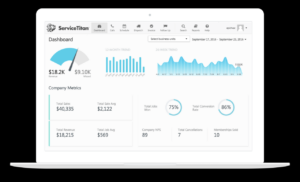In the ever-evolving HVAC industry, the adoption of business management software has emerged as a game-changer, transforming operations and driving success. From streamlining scheduling and dispatching to enhancing customer relationships and boosting profitability, this software empowers HVAC businesses to reach new heights of efficiency and growth.
With a comprehensive suite of features and the ability to integrate seamlessly with other business systems, HVAC business management software provides a centralized platform for managing all aspects of your operations, enabling you to make informed decisions, optimize resources, and deliver exceptional customer experiences.
Contents
- 1 Features and Benefits of HVAC Business Management Software
- 2 Best Practices for Implementing HVAC Business Management Software
- 3 Choosing the Right HVAC Business Management Software for Your Business
- 4 Using HVAC Business Management Software to Improve Efficiency and Profitability
- 5 Emerging Trends in HVAC Business Management Software
- 6 Last Recap
Features and Benefits of HVAC Business Management Software
HVAC business management software offers a comprehensive suite of features designed to streamline operations and enhance efficiency for HVAC businesses. These features encompass scheduling, dispatching, invoicing, and customer management, among others.
Scheduling and Dispatching
Automated scheduling and dispatching modules enable HVAC businesses to efficiently manage technician assignments, ensuring timely and optimized service delivery. These modules consider factors such as technician availability, skill sets, and location to optimize scheduling and dispatching processes, minimizing downtime and maximizing technician utilization.
Invoicing and Billing
Integrated invoicing and billing features simplify the financial management aspect of HVAC businesses. These features allow for the creation and customization of invoices, automated payment processing, and real-time tracking of payments and receivables. This streamlining of the billing process reduces errors, improves cash flow, and enhances financial transparency.
Customer Management
Robust customer management capabilities enable HVAC businesses to effectively manage customer relationships, track interactions, and provide personalized service. These features include customer profiles, service history tracking, and automated communication channels, empowering businesses to nurture customer relationships, build loyalty, and drive repeat business.
Cloud-Based vs. On-Premise Solutions
Cloud-based HVAC business management software offers several advantages over on-premise solutions. Cloud-based software eliminates the need for expensive hardware and IT infrastructure, reducing upfront investment costs. It also provides remote accessibility, allowing technicians and management to access data and manage operations from anywhere with an internet connection.
Additionally, cloud-based software benefits from automatic updates and maintenance, ensuring access to the latest features and security patches without the need for manual intervention.
Best Practices for Implementing HVAC Business Management Software
Planning and preparation are crucial for successful implementation. Define clear goals, establish a project timeline, and identify key stakeholders. Ensure data integrity by migrating existing data accurately and thoroughly. Comprehensive training empowers users, so provide ample opportunities for hands-on learning and support.
User Adoption and Resistance to Change
Embrace a user-centric approach by involving users throughout the implementation process. Address concerns, provide training, and foster a positive attitude towards change. Encourage feedback and continuous improvement to increase user satisfaction and adoption.
Integration with Other Business Systems
Integrate HVAC business management software with CRM and accounting systems to streamline operations and improve data flow. This enhances efficiency, reduces errors, and provides a holistic view of business performance.
Choosing the Right HVAC Business Management Software for Your Business

Choosing the right HVAC business management software is crucial for streamlining operations, increasing efficiency, and enhancing customer satisfaction. Consider the following key factors when selecting software:
Size of Business
- Small businesses: Look for software that is user-friendly, affordable, and offers basic features.
- Medium-sized businesses: Require more robust software with advanced features, such as inventory management and CRM.
- Large businesses: Need comprehensive software solutions that can handle complex operations, such as multi-location management and integration with other systems.
Industry
- Residential HVAC: Software should focus on scheduling, invoicing, and customer management.
- Commercial HVAC: Requires software with features for project management, equipment tracking, and maintenance contracts.
li>Industrial HVAC: Needs software with advanced capabilities for energy management, predictive maintenance, and compliance tracking.
Budget
- Free or low-cost software: Suitable for small businesses with basic needs.
- Mid-priced software: Offers more features and support for growing businesses.
- Enterprise-level software: Provides comprehensive solutions for large businesses with complex operations.
Additionally, consider getting a demo and trial before purchasing HVAC business management software. This allows you to experience the software firsthand and evaluate its suitability for your business.
Using HVAC Business Management Software to Improve Efficiency and Profitability
HVAC business management software can be a powerful tool for businesses looking to improve efficiency and profitability. By automating tasks, streamlining processes, and providing valuable data, the software can help businesses save time, money, and improve customer satisfaction.
For example, one HVAC business used the software to automate its scheduling process. This freed up the company’s technicians to spend more time on billable work, which resulted in a 15% increase in revenue. Another HVAC business used the software to track its inventory levels.
This helped the company to reduce its inventory costs by 20%.
In addition to saving time and money, HVAC business management software can also help businesses improve customer satisfaction. By providing technicians with access to real-time information about customer accounts, the software can help them to resolve issues quickly and efficiently.
This can lead to increased customer satisfaction and loyalty.
Using Data to Make Informed Business Decisions
One of the most important benefits of HVAC business management software is that it provides businesses with valuable data that can be used to make informed business decisions. The software can track a variety of metrics, such as sales, expenses, and customer satisfaction.
This data can be used to identify trends, pinpoint areas for improvement, and make strategic decisions about the business.
For example, a business might use the software to track its sales data. This data can be used to identify which products and services are most profitable and which ones are not. The business can then use this information to make decisions about which products and services to focus on.
HVAC business management software can be a valuable tool for businesses looking to improve efficiency, profitability, and customer satisfaction. By automating tasks, streamlining processes, and providing valuable data, the software can help businesses save time, money, and make better decisions.
Emerging Trends in HVAC Business Management Software
The HVAC business management software industry is constantly evolving, with new trends emerging all the time. These trends are being driven by the need for businesses to become more efficient, productive, and profitable. In this section, we will discuss some of the most important emerging trends in HVAC business management software and how they are shaping the future of the industry.
One of the most significant trends in HVAC business management software is the increasing use of artificial intelligence (AI). AI can be used to automate a variety of tasks, such as scheduling appointments, generating invoices, and tracking customer data. This can free up HVAC businesses to focus on more strategic tasks, such as growing their business and improving customer service.
Another important trend is the increasing use of machine learning (ML). ML is a type of AI that allows computers to learn from data without being explicitly programmed. This can be used to improve the accuracy of HVAC business management software, as well as to identify new trends and opportunities.
Finally, mobile technology is also playing an increasingly important role in HVAC business management software. Mobile apps can be used to access HVAC business management software from anywhere, at any time. This can give HVAC businesses a competitive advantage by allowing them to respond to customer needs more quickly and efficiently.
Examples of HVAC Businesses Using Emerging Trends
- Trane Technologies is using AI to automate its customer service operations. This has resulted in a 20% reduction in customer service costs.
- Carrier is using ML to improve the accuracy of its energy efficiency predictions. This has helped Carrier to win more contracts with customers who are looking to reduce their energy costs.
- Johnson Controls is using mobile technology to give its technicians access to HVAC business management software in the field. This has resulted in a 15% increase in technician productivity.
Last Recap
As the HVAC industry continues to evolve, so too will the capabilities of business management software. By embracing these advancements, HVAC businesses can position themselves for long-term success, unlocking new opportunities for growth and profitability while delivering unparalleled service to their customers.

